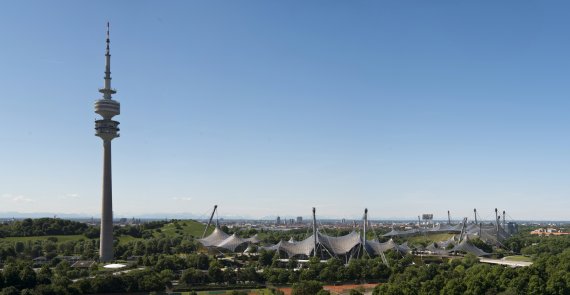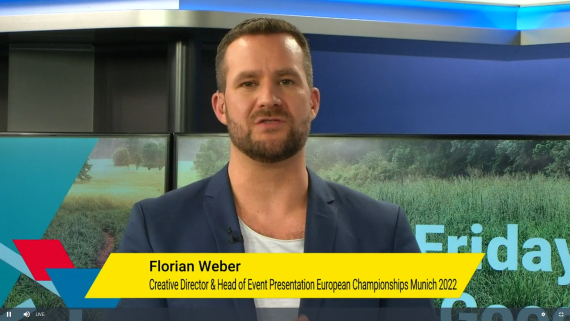
"We want to be the light at the end of the tunnel," said Florian Weber, Creative Director & Head of Event Presentation at the European Championships Munich 2022, as recently as last year. This statement is doubly true. Firstly, because at the European Championships 2022, after the Corona restrictions of previous years, thousands of spectators will finally be able to cheer on the 4700 athletes at their European Championships in athletics, beach volleyball, canoe racing, climbing, cycling (including road, track and BMX freestyle), rowing, table tennis, triathlon and gymnastics.
But the big event should also be light at the end of the tunnel for all those who organize large sporting events. Acceptance of such events is currently low around the globe. This is shown by various referendums in cities applying for the Olympic Games. In Munich, for example, around 52 percent of citizens rejected a bid for the 2022 Winter Olympics in 2013.

Instead, the big event will take place in Beijing, where the population has no say in such decisions. Munich is celebrating the 50th anniversary of the 1972 Summer Olympics on a smaller scale with a multi-European championship instead. Weber: "We want to show Germany and the world that there is a sustainable way to organize such events. A way that brings benefits and doesn't tear a big hole in the budget."
This is to be achieved with the help of the 1972 Olympic Park, which is actually a very good example of the sustainable use of infrastructure created by a major event. The Olympic Stadium and the large Olympic Hall are regularly used open air or indoor for large events. The Olympic swimming hall is just as popular with normal visitors as it is with clubs or top athletes. And the Olympic Park itself, as a green lung in the heart of Munich, is also heavily frequented by athletes and recreation seekers.
More than five decades after it was built, this is exactly where another major event will take place that could set standards as it did back in 1972. At least some of the competition venues, with sustainable catering, are to become examples of how such major events can be organized with zero waste. Instead of cars as a means of transport, public transport should be used as much as possible. This is also because the hotels for participants and visitors at this event of short distances will be close to the competition venues around the Olympic Park, in the center of Munich and at the regatta center in Oberschleißheim. In total, the organizers have defined six sustainability goals.
These include supporting local value creation and getting the entire region on board. "For example, we are planning a major school program with a competition," Weber reports. Schools and clubs should also benefit directly, for example by receiving sports equipment used at the event for subsequent use. Also very important, according to Weber: "We don't just want to inspire sports fans, but also do something for non-sports fans. We want to create memories, surprising and unexpected experiences."
These Venues Combine Sport and Biodiversity in Cities
The accompanying festival "The Roofs" in the Olympic Park also attracts non-sports fans with a colorful mix of culture, art, music and food. There are also new ideas in the sports area: special "Meet and Greet" zones will give fans the opportunity to get really close to Europe's best athletes. "There are mixed zones for TV, mixed zones for journalists, but so far no mixed zones for spectators. Until now," Weber says.
He firmly believes that Munich 2022 will make history. As a model of what a sustainable event of the future could look like.
- Awards
- Mountain sports
- Bike
- Fitness
- Health
- ISPO Munich
- Running
- Brands
- Sustainability
- Olympia
- OutDoor
- Promotion
- Sports Business
- Textrends
- Triathlon
- Water sports
- Winter sports
- eSports
- SportsTech
- OutDoor by ISPO
- Heroes
- Transformation
- Sport Fashion
- Urban Culture
- Challenges of a CEO
- Trade fairs
- Sports
- Find the Balance
- Product reviews
- Newsletter Exclusive Area
- Magazine




















